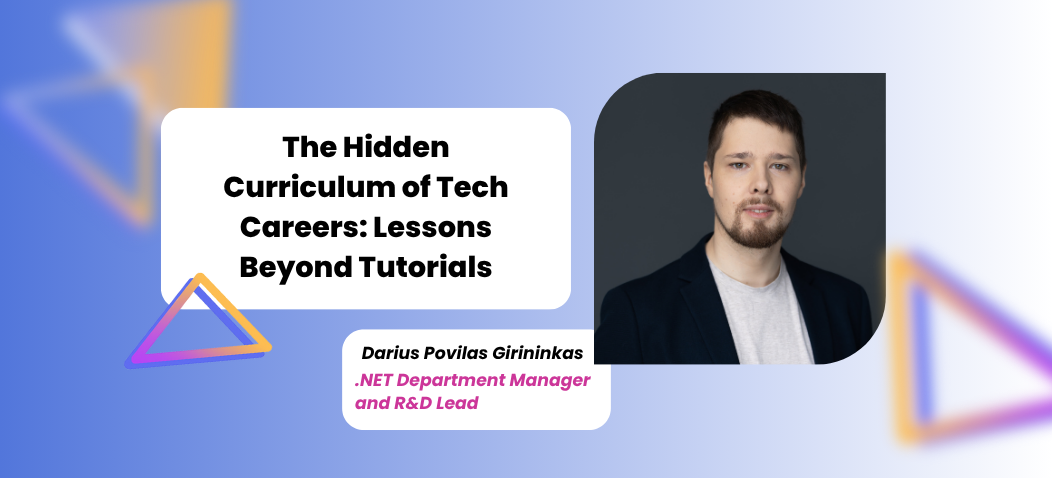|
Getting your Trinity Audio player ready…
|

When people imagine building a career in tech, they often picture coding challenges, technical tutorials, and mastering frameworks. But ask any seasoned professional, and you’ll hear a different story: the most valuable lessons are rarely about syntax or algorithms. Instead, they live in what many call the “hidden curriculum”- the unwritten rules, soft skills, and lived experiences that shape long-term success.
We sat down with Darius Povilas Girininkas, .NET Department Manager and R&D Lead, who generously shared his reflections on these behind-the-scenes lessons. His answers remind us that thriving in tech is not just about writing code but also about building relationships, communicating clearly, and embracing resilience.
Embracing Unexpected Opportunities
One of the first lessons Povilas learned in his career was that your dream role doesn’t always arrive on day one.
“What you want to do very rarely matches the opportunities you get. If you don’t resist that and embrace it, it can actually be a good thing. It can lead you to discover things about yourself you didn’t know and find things you never thought you would enjoy.”
Instead of treating detours as setbacks, he sees them as steppingstones – opportunities to grow into skills and passions you didn’t expect.
Communication as the Real Superpower
Technical skills may land you a job, but communication often makes or breaks your success on a team. For Povilas, the key is to invest time in real conversations.
“1-on-1 meetings, especially live, are crazy effective for building relationships, which then leads to significant improvement in mood and communication.”
He recalls situations where teammates warned him that someone was “impossible to work with.” Instead of accepting that label, he chose to approach openly, listen, and invest time in understanding the person. The result? Productive collaborations that others thought were impossible.
When it comes to cross-cultural teams, he admits it’s an ongoing learning journey but recommends resources like The Culture Map to help decode differences and build stronger global collaboration.
Documentation as a Tool for the Future
For many developers, documentation feels like a chore. But Povilas reframes it as a gift to your future self and your team.
“I try to put myself into the reader’s shoes: how will ‘future me’ read this after I’ve forgotten everything specific about the situation? Who is the audience, and what do they need?”
He stresses that good documentation is not about volume but clarity. Smart documentation saves time and headaches during maintenance, especially since software always changes. From documenting assumptions and dependencies to writing code that explains itself, his philosophy is simple: document what’s not obvious, and document why.
Poor documentation, he notes, often leads to wasted effort, like building features no one really needs. His antidote is always asking: “What value does this provide?”
Standing Out Beyond Technical Skills
When it comes to hiring, Povilas looks beyond technical knowledge.
“Motivation, interest in work, and being real make candidates stand out.”
He encourages young professionals to prepare stories about their past projects, practice answers with someone in the industry, and enter interviews ready to talk not just about what they did, but the impact it created. Confidence comes not from winging it but from preparation.
And one piece of hidden advice? Don’t be afraid to ask for what you want. Pushing for opportunities may not always succeed, but it often puts you in a stronger position in the long-term.
Feedback as a Growth Engine
Feedback can feel uncomfortable, but Povilas frames it as an essential fuel for growth.
“If you want to do things better and be happier, you should accept all, even unpleasant feedback.”
When giving feedback himself, he takes a structured approach: clarify the situation, state expectations, listen to the other side, and document the discussion to ensure nothing gets lost. He stresses the importance of following up- treating feedback not as a one-time event but as a process of continuous improvement.
For younger professionals, his advice is clear: mistakes are inevitable in complex work, but they should be used as opportunities to learn. Criticism isn’t personal; it’s a tool for raising quality and reducing stress over time.
The Golden Rule
After decades in tech, if he had to leave juniors with one lesson, it would be this:
“Be kind. Both to others, but also to yourself. That, counterintuitively, means you should not sugarcoat things or avoid difficult conversations.”
Kindness, in his view, is about honesty, openness, and respect- qualities that foster trust and resilience in the long run.
Final Thoughts
The hidden curriculum of tech is made up of countless small lessons: how to communicate across cultures, how to write for your future self, how to accept feedback, and how to navigate the unpredictable paths of a career. As Povilas reflections show, these lessons aren’t in tutorials or textbooks- they’re learned through experience, mentorship, and conversation.
For those starting their journey in tech, remember: success is about more than just code. It’s about embracing growth, preparing with intention, and leading with kindness.
